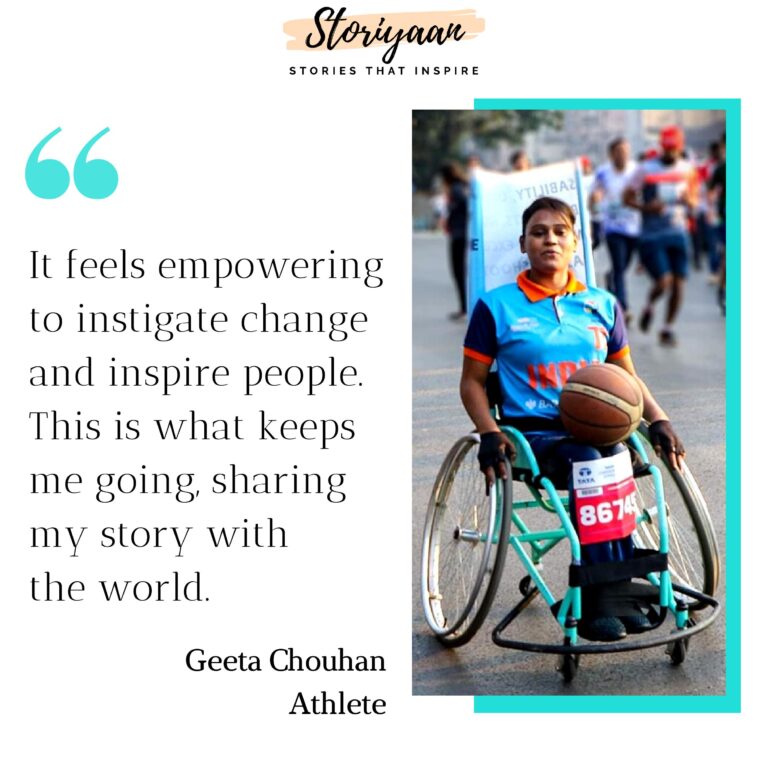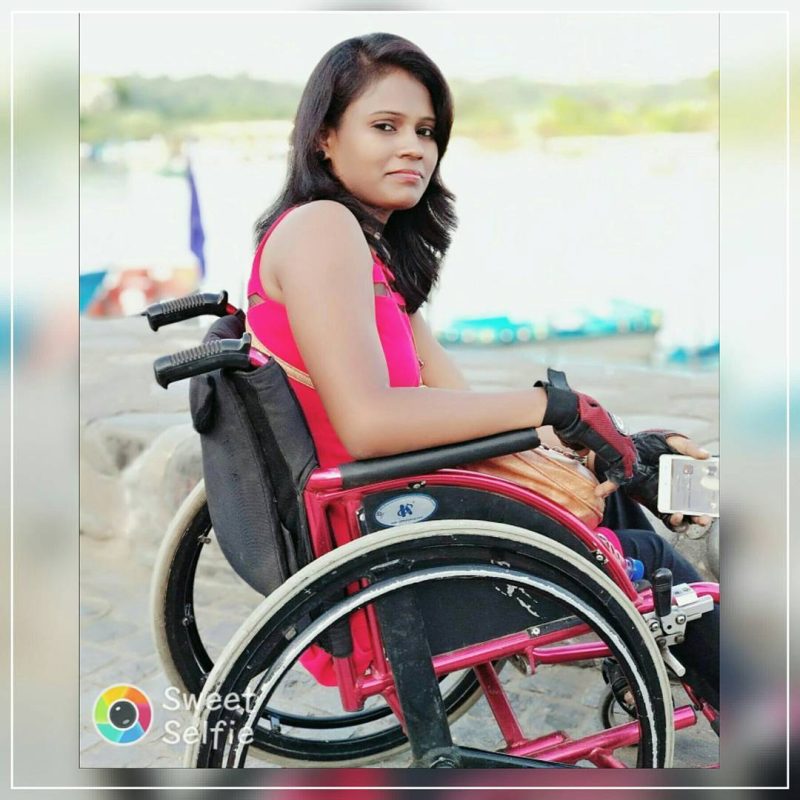Born into a middle-class family in Mumbai, Geeta Chouhan is more commonly known as India’s star Wheelchair hoopster. Her personality oozes of enthusiasm, determination, and a never give up attitude. She never let any obstacles of her life deter the strong self-belief that she had. She is a vehicle of change and inspires those around her.
In a conversation with Storiyaan, this eminent sportsperson talks about the discrimination she faced on account of her disability and emphasizes on the importance of education. She also mentions her love for other sports like wall-climbing. Geeta Chouhan lets us in on extremely personal aspects of her life as shares her experience of competing at the Asian Para Games. Her words are sure to leave you with a refreshing perspective on life.

Interview
Questions and answers
How did you hold up mentally when you suffered the greatest loss of losing your ability to walk?
I was six that time when tragedy hit home for me. The thing about disability is that it’s not acknowledged much, so we’re left to face our struggles all alone. When I got into sports, I could own it and conquer my goals and dreams through it. It’s been a roller coaster ride for me, but I’ve gotten through it.
We often hear claims of provisions made for people with physical disability in job and education sectors. From your personal experience, what can you infer about the extent of truth behind this?
It’s the harsh truth, but the job front is very biased towards the disability spectrum. I want to shout from mountain tops that just because people are disabled, doesn’t mean they’re incapable. When I got admission into college, I had to enroll for a plethora of jobs to be able to pay the fees, and sadly, the rejections I faced were all attributed to one cause – my disability.
A lot of people, even today, refuse to get their children vaccinated against polio – some out of ignorance, some out of religious and superstitious bias. As someone who has faced great tragedies because of the virus, what do you think can be done to alleviate this problem?
My parents were not as educated or aware of disabilities and diseases back then, and hence, I was not vaccinated. In rural or remote areas, sometimes people hold on to their traditional beliefs without realizing the impact it can have on their children. One wrong decision on their part can ruin a life, and only education can right this wrong. People are also prejudiced against those with disabilities. I have been a victim of it, where people refused to even sit beside me or disallowed their children to play with me. Thankfully, this thought process is going through a change, slowly, but surely.
How did winning the 6th National Wheelchair Basketball Championship provide you with the ray of hope that you would be able to move on to greater things in life?
Compared to my 1st Nationals competition in Hyderabad, I wasn’t as experienced as I was in the 6th. The first one was relatively horrid, I wasn’t accustomed to playing basketball in a wheelchair, but gradually it got easier with practice. My highest score till now has been the 5th and 6th National competition, which has been exceedingly liberating for me.
How exalted did you feel when an article about you was published in Aaj Amar Ujala Newspaper?
To be honest, there have been many write-ups, and sometimes it gets hard to search for one among the swarming amount of articles. It feels empowering to instigate change and inspire people. This is what keeps me going, sharing my story with the world.
It was your mother who stood up for you when even your father had given up on you. How did you deal with that phase in your life?
It wasn’t easy to face rejection from my dad and to see that he didn’t have faith in me, his own daughter. My dad would never let me out because of my disability; he was very overprotective and constantly afraid. It’s my mother’s support that has kept me going, and for this, I’m forever indebted to her. She had faith in me and dreamt that I would be successful, and here I am today.
Tell us about your first experience when you tried your hand at wall-climbing. What compelled you to try it out?
It wasn’t pre-decided, my friend informed me about an event that was taking place, and I went. Two participants tried it before me, and they all accepted defeat. On seeing that, I had no hope for myself. However, I went ahead, and by the time I reached the half-way mark, I grew more confident, and I completed the task successfully. After that, I started receiving offers for wall-climbing, and I continued to participate and enjoy the adventure.
It wasn’t pre-decided, my friend informed me about an event that was taking place, and I went. Two participants tried it before me, and they all accepted defeat. On seeing that, I had no hope for myself. However, I went ahead, and by the time I reached the half-way mark, I grew more confident, and I completed the task successfully. After that, I started receiving offers for wall-climbing, and I continued to participate and enjoy the adventure.
What are the challenges you faced during the Tata Mumbai Marathon?
It wasn’t a huge challenge for me as the distance was not as much as I had expected; it was about 1-2 kilometres. I wanted to push myself to complete 21 km, but that wasn’t an option for disabled people in the Tata Marathon.
You represented India in the Asian Para Games Qualifying trials at Bangkok. How was the experience?
I was selected within one year to compete in the Asian Games. The competition was intense and more daunting than anything we had faced in our home country. The wheelchairs they used there had an auto-pilot system whereas mine was manual. This required me to push myself more than ever before, as the foreign competitors were better equipped and equally trained. Unfortunately, we could not win, but when you fall out of your chair and have to help yourself to save time during the game and maintain defence, you learn so much.
What was your training regimen before the Asian Para Games? What was the greatest hurdle during the training?
A challenging hurdle was the fact that our coaches kept changing before the match. Apart from that, we lacked experience, and this made the players nervous. To win the match, we had first to conquer our fears. We had never participated on an international platform before, and this put a lot of pressure on us. It is this very pressure that narrowed our chances of gaining a victory for our country.
There was an article where you mentioned you are hoping to participate in the Olympics next year. How are you preparing for it?
I haven’t even been able to perform for the qualifying test of the Paralympics yet. So my participation in the Olympics is postponed for now, but I’m hoping for the best.
Quick 5
a. Favourite pass time? – I can’t name a particular one.
b. Biggest inspiration? – I have never been a follower; rather, I wanted people to follow me
c. Biggest regret in life? – 2018, I scored great in my finals but couldn’t win
d. Your daily mantra – Waking up early and riding my wheelchair for 4-5 km
e. Basketball or tennis? – Basketball

